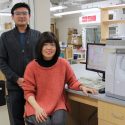UW-Madison animal programs achieve highest accreditation
The Association for Assessment and Accreditation of Laboratory Animal Care International (AAALAC) has continued the “Full Accreditation” status for animal research programs for another three years in three major divisions of the University of Wisconsin–Madison: the Graduate School, the School of Medicine and Public Health, and the School of Veterinary Medicine.
After an intensive, four-day inspection, in October 2011, eight AAALAC expert site visitors gave 18 program commendations plus several suggestions for improvement. All of these recommendations, including establishing a monitoring system for identification of expired drugs and improved training for handling potentially toxic substances, were satisfactorily addressed within several months of the site visit, says Eric Sandgren, director of the Research Animal Resources Center on campus. Thus, when the full AAALAC Council discussed the UW–Madison programs in February, each was awarded full accreditation with no additional suggestions for improvement.
“This was a comprehensive evaluation of all aspects of the animal program,” says Sandgren. “They didn’t just drop in to one facility for a short time; they physically examined every facility and every room that houses animals, read animal care and use committee minutes, examined animal-research protocols, and assessed whether these protocols were being followed. They talked to animal caretakers, grad students and investigators, veterinarians, and animal care and use committee members to develop a comprehensive sense of our program’s strengths and weaknesses.”
AAALAC inspectors come from research universities and businesses that perform animal research, he adds. “We know that they don’t rubber stamp, because they are not shy about pointing out things that should be done differently.”
In 2003, for example, AAALAC placed UW–Madison animal programs on probation until the university strengthened its program of occupational health for people working with animals. “Full accreditation was returned in 2004,” says Sandgren.
AAALAC accreditation is voluntary, and Sandgren sees it as further proof that the university is serious about the health and well being of its animals and the people who work with them.
In its inspections and evaluations, AAALAC relies on the Guide for Care and Use of Laboratory Animals, a document that must be followed by institutions receiving Public Health Service funds. One other division of the university, the College of Agricultural and Life Sciences, is fully accredited, and has its next reaccreditation visit this autumn. The College of Letters & Science also has decided to seek accreditation, Sandgren adds.
Tags: animal research, biosciences, research



